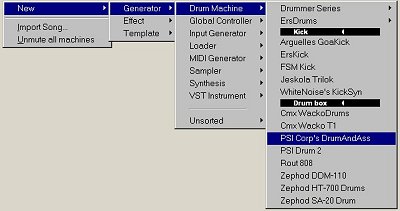
Our first machine will be a triggered machine - that is, we will nominate the instant it is to be set off (or triggered).
Point to some
blank space on the Machine view desktop and right-click.
New -> Generator -> Drum Machine -> PSI Corp's DrumAndAss:

Once you have selected your drum generator, we need to connect it to the master:
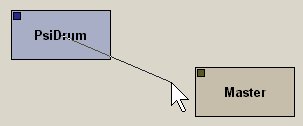 shift+leftClick+drag |
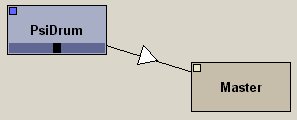 the connected machine |
We can change the character of the sound the machine will make 'up front' by double-clicking on the machine:

Most machines have parameters which can be changed by using the sliders. Close this dialog box when finished.
You can change the volume of the machine by left-clicking on the triangle on the connecting line:
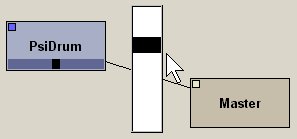
Some machines are mono machines - their sound, unaltered, appears to come from centre-field. Other machines, like the one we have inserted here are stereo machines. You can pan their sound either left or right by click-dragging the pan bar:

When playing a song in Buzz, you can Mute a machine (i.e. turn it off so it is silent). This is particularly useful when a song gets complex and you need to solo a machine so you can hear it instead of the other noise. You do this by clicking on it's LED:

Make sure the machine is ON. Once you have created a sound-making apparatus, you need to define patterns of noises that it will make.
Switch to the Pattern Editor:
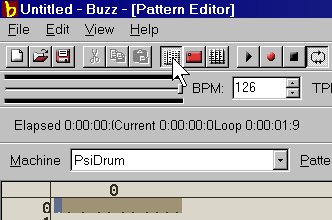
The pattern editor is where we define patterns (either trigger or note patterns) for our machines to play. Pointing to the pattern editor desktop, right-click and select new pattern from the context menu:
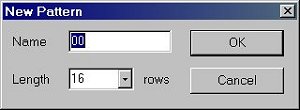 a new pattern |
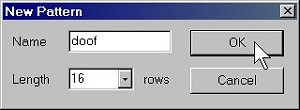 a new pattern, named, OK |
We will add some details to the new pattern. Using the arrow keys, you will notice each column controls a different thing. In the pattern below, I have placed a trigger at beat 0 and another at beat 8 (the beats are listed down the side of the patter (0-15 = 16 beats total for this pattern).
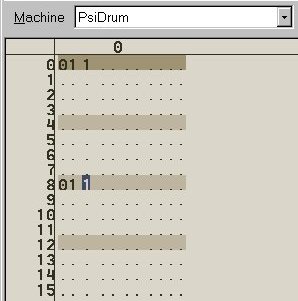
I have also specified sample 01 to be played at each of the trigger events. This particular drum machine has 28 different percussion samples built into it - 01 is a type of kick drum which will provide our basic doof.
Now this pattern is defined, we have to place the pattern in the sequencer to play it. To do this, switch to the Sequence Editor:
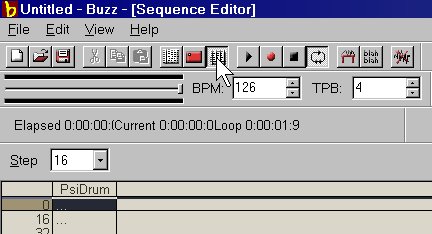
You will see your defined sequence on the right-hand side - it was the first sequence, so it is called 0. In the PSIDrum track, type a 0 to indicate you want that pattern played at step 0:
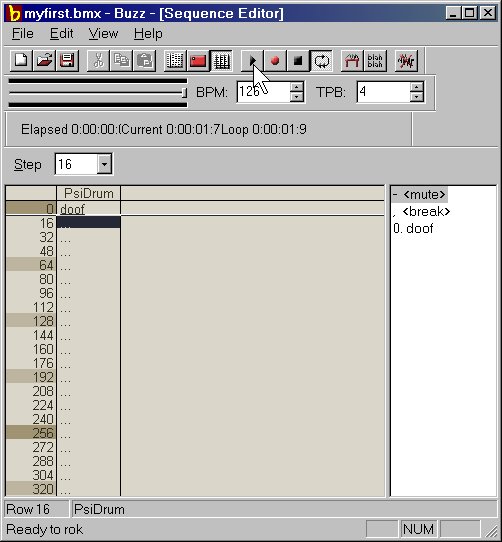
And now you are ready to play your first Buzz noises - press the Play icon and a rhythmic beat should start. You might also notice the step is set to 16 - this corresponds to the number of beats in the pattern created in the pattern editor.
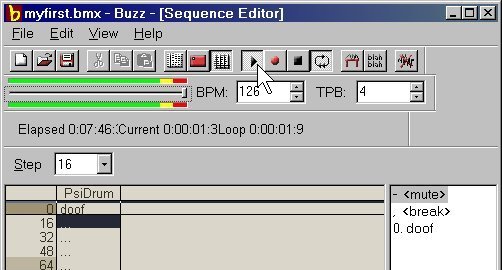
As this sequence plays, you will notice the master volume peaks red - the indicates the sound is distorting, so you need to trim the volume until you get occasional peaks:
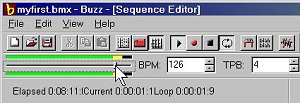
You now have your basic drum beat. Go forward to add cymbals to this pattern...
pwhitehouse@optushome.com.au
Buzz © Jeskola
![]()